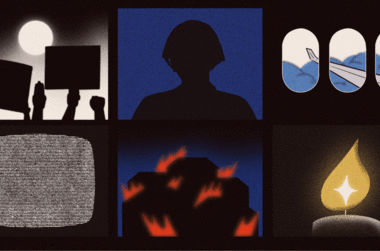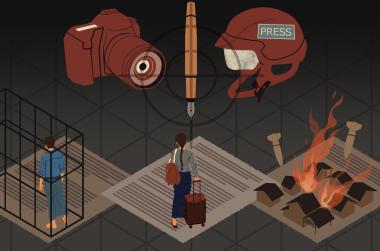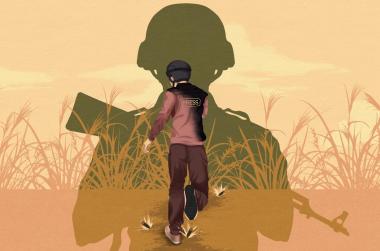The author is a journalist from Kayin State and they are receiving support from The Kite Tales to write these diaries.
On the morning of April 12, 2023, Myanmar’s military launched an aerial bombing raid on Pazi Gyi village, in central Sagaing Region, killing about 80 people, including children.
For one young Kayin reporter far away from the bloodshed over the border in Thailand, covering that attack “was the worst day of my life”.
"My heart couldn't bear it. I felt completely disoriented," she told me.
It haunts her still.
Hers is a familiar experience for many Myanmar journalists in exile, unable to escape the grim realities of the junta's brutality because their days are spent gathering news of the loss, grief, and despair back home.
They often experienced the pain as if it were their own.
Before Myanmar’s 2021 military coup upended her life and tore her from her family, this young Kayin woman was a recent graduate, volunteering as a teacher at a small primary school in her native village.
When the military seized power, she wanted to join the protests.
"I started sharing the news on social media and kept a close ear out for any updates. I realised that only by being informed could we escape the military dictatorship's cruelty," she told me.
Her parents, however, did not approve and forbade her from leaving the village. Most villagers were apolitical and care mostly about making donations during the alms-giving season and living peacefully, sometimes via remittances from children working abroad. Her parents had similar sentiments, she said.
At that time, civil servants opposing the military coup joined the Civil Disobedience Movement (CDM), leaving many positions vacant. Her mother pressured her to fill one of these roles.
"My mother told me to either join an open civil service position or become a government-appointed village teacher. My friends, who were government-appointed teachers, had joined the CDM so I resisted taking over their vacant positions," she recounted.
Unable to stand her mother's pressure, she eventually made the painful decision to leave home.
She ended up in Myawaddy, where some of her university friends lived. She got a job but it was with a business with military links, which made her uncomfortable, and she ended up leaving
It was during the third wave of COVID-19, making it difficult to cross into Thailand. So she and some friends headed to Lay Kay Kaw, a town on the Myanmar side of the border that was largely under the control of the Karen National Union, the largest armed group that has been fighting the junta for decades.
At that time, Lay Kay Kaw was a vibrant "peace city" where opponents of the military had sought refuge. It was bustling with CDM participants, politicians, activists, journalists, and young people training for military resistance against the junta.
She volunteered at the COVID ward opened in the local school and took a basic journalism course organized by media professionals. This marked the beginning of her practical experience in news writing.
However, on December 15, 2021, the military launched “a clearance operation” (Editor: a euphemistic term for an attack) in the Lay Kay Kaw area and she was displaced, eventually fleeing across to the Thai border of Mae Sot, along with other journalists from her news agency.
As undocumented entrants, they had to work in secret to avoid arrest by Thai police.
But the stories they report on each day from Myanmar have taken a heavy toll.
After three years, just gathering information for articles and interviewing women affected by conflict became emotionally unbearable for this young woman.
The Pazi Gyi attack was the final straw.
She found herself replaying the stories she heard every night before bed, and the horrific scenes flashed before her eyes.
Consulting her editors, she was granted time off to rest and seek counseling.
To change her mindset, she forced herself to listen to music, watch movies, talk to female journalist colleagues. She would feel alright during the day, but the nights were harrowing.
"The doctor gave me medicine to help me sleep but as soon as I closed my eyes, the images would reappear," she shared.
She says she is beginning to feel better, but she still struggles to be emotionally detached from her work.
"If I feel this way, imagine the depth of suffering felt by the women and children who directly experienced these events,” she said.
“The trauma I feel is nothing compared to theirs.”
The artwork is by Songbird who is receiving support from The Kite Tales to produce illustrations.





